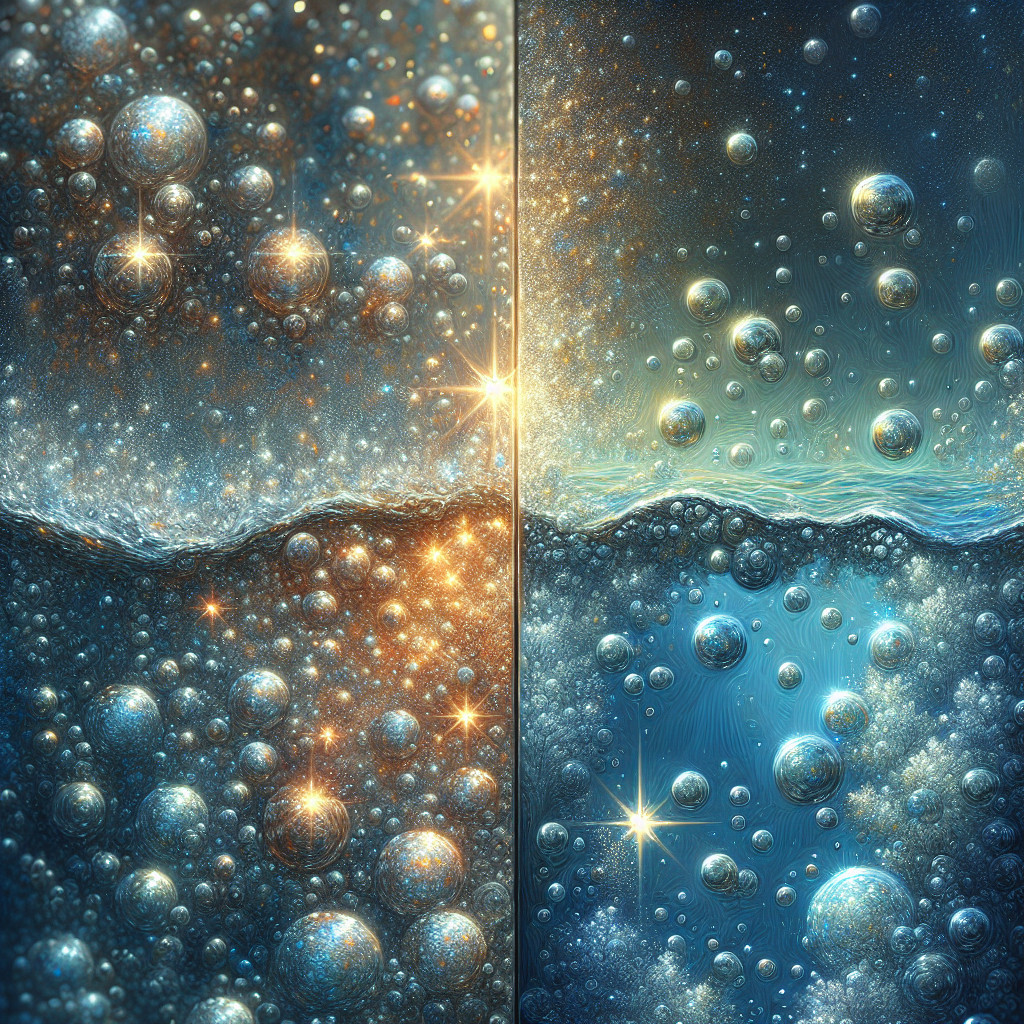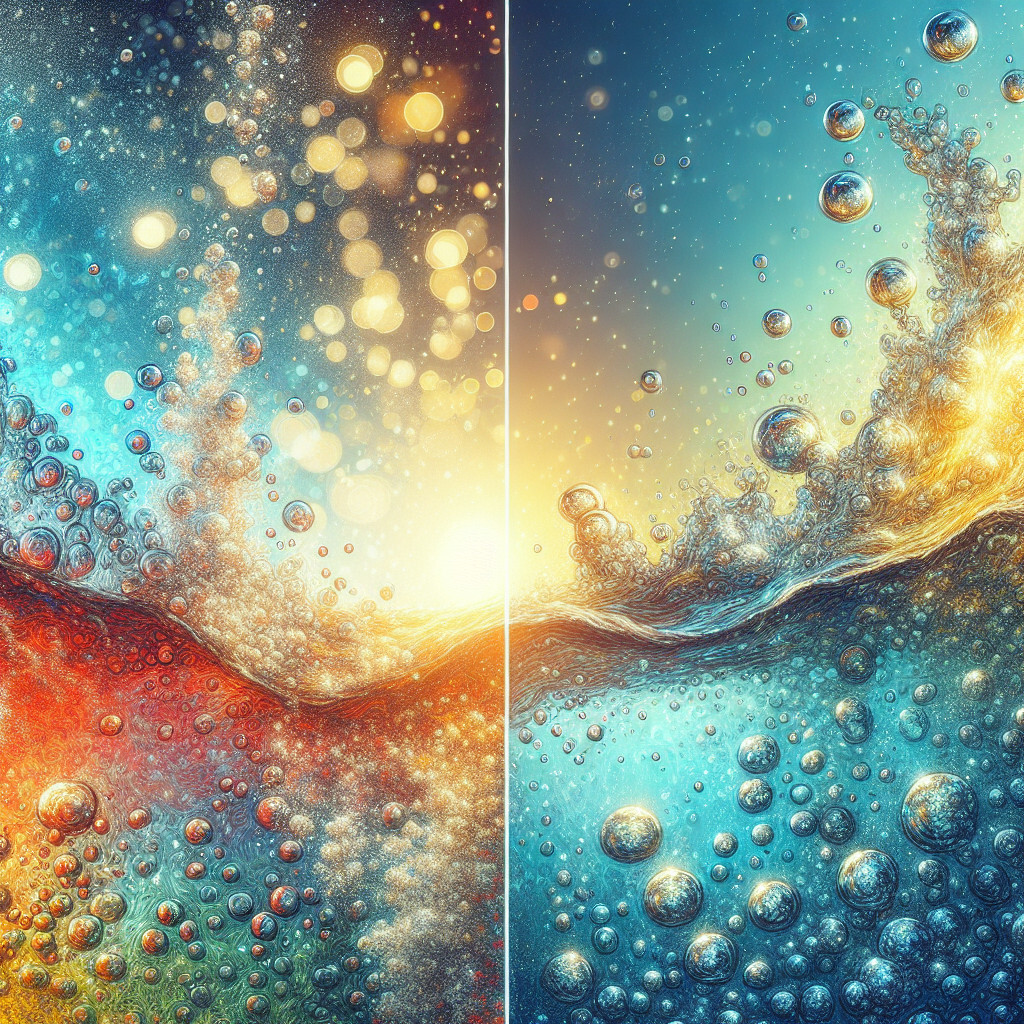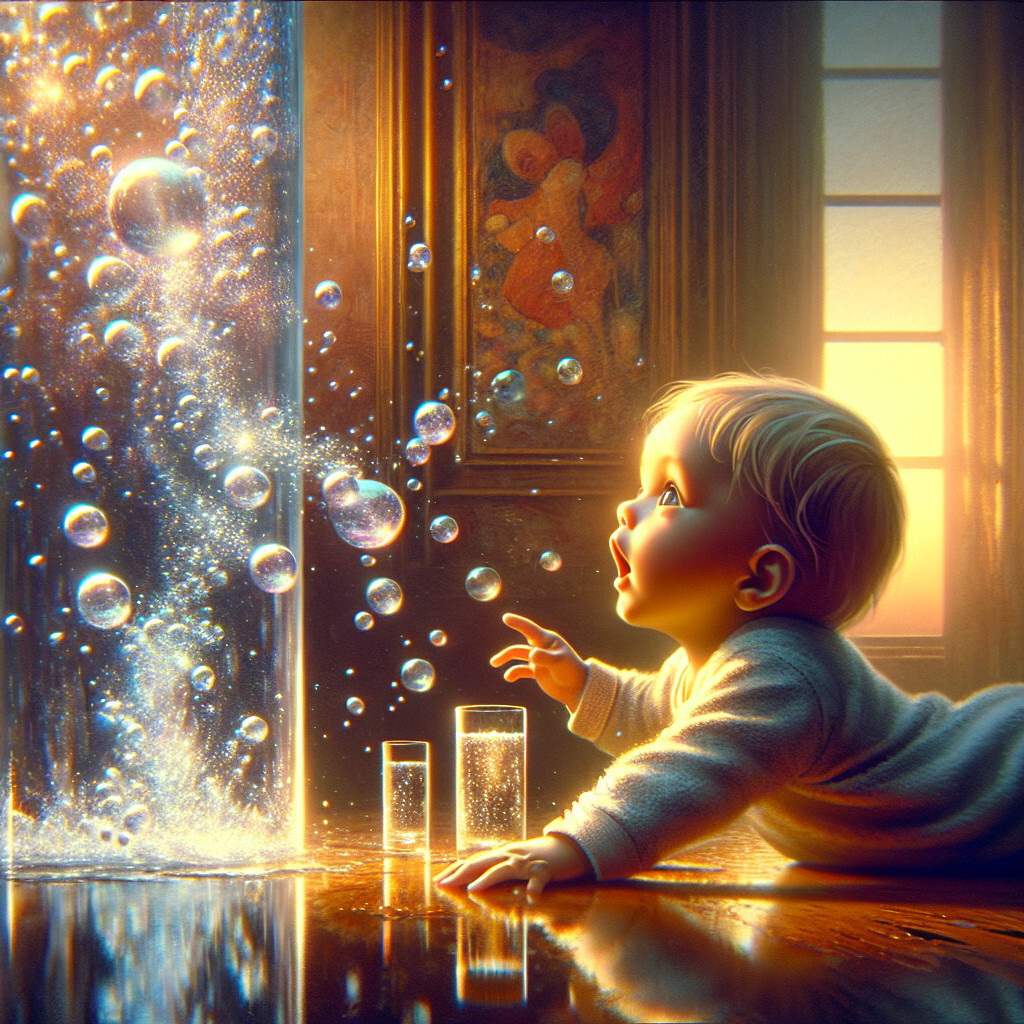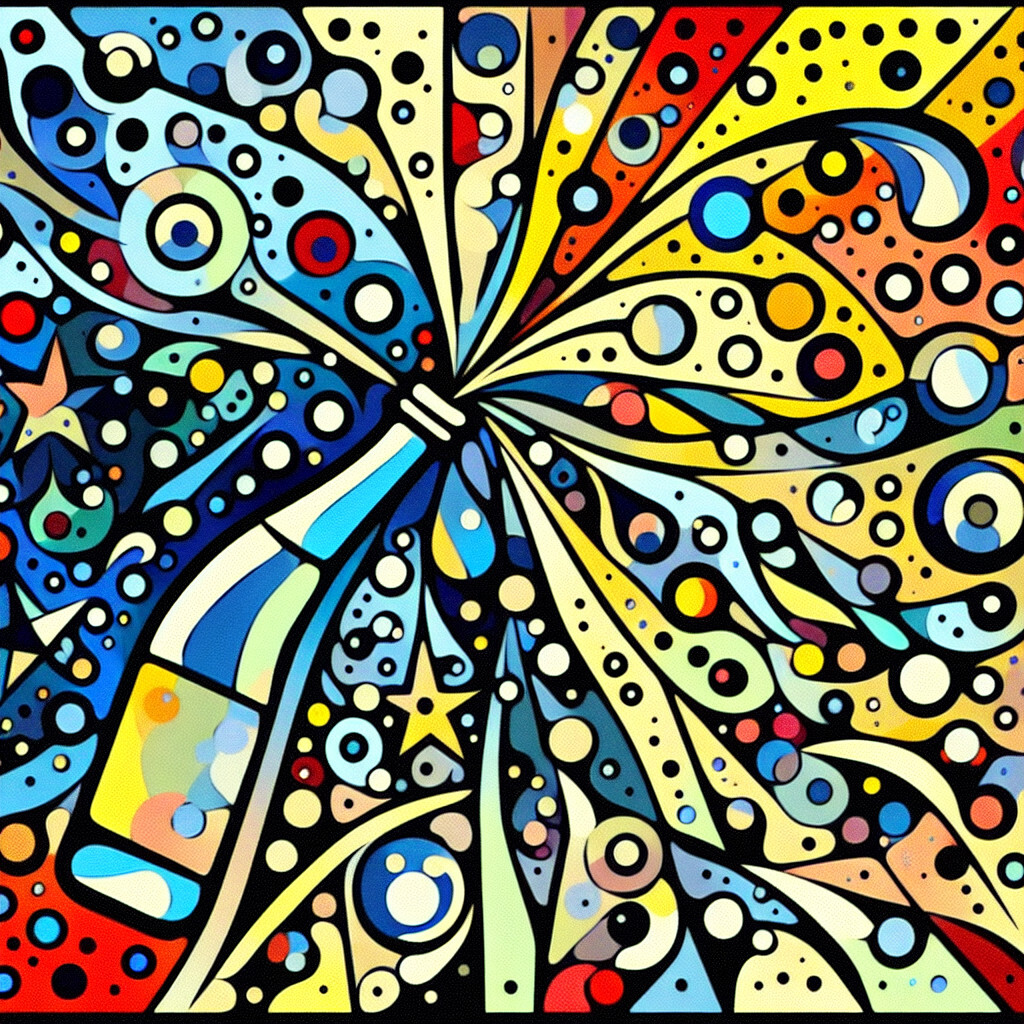-
Table of Contents
“Sparkling or Still: Choose Your Hydration Style!”
Introduction

Sparkling water and regular water are two types of hydration sources consumed globally. Regular water, also known as still water, is the most basic form of water, free from any additives, and is essential for human survival. On the other hand, sparkling water, also known as carbonated water, is infused with carbon dioxide gas under pressure, giving it a fizzy and tangy taste. While both serve the primary purpose of hydration, they differ in taste, texture, and often in their mineral content, making them preferred choices for different individuals and occasions.
Health Benefits: Sparkling Water vs Regular Water
Water is a fundamental element of life, and its consumption is essential for maintaining good health. However, in recent years, a new trend has emerged in the beverage industry: sparkling water. This fizzy alternative to regular water has gained popularity for its refreshing taste and perceived health benefits. But how does it compare to regular water in terms of health benefits? Let’s delve into this topic.
Regular water, also known as still water, is the most natural form of hydration. It is free from calories, sugars, and artificial additives, making it the healthiest beverage choice. Regular water aids in digestion, helps maintain a healthy weight, keeps the skin hydrated, and is crucial for the proper functioning of all bodily systems. It also plays a vital role in flushing out toxins from the body and maintaining a balanced body temperature.
On the other hand, sparkling water, also known as carbonated water, is regular water into which carbon dioxide gas has been dissolved under pressure. This process gives the water its characteristic bubbles and fizzy sensation. Sparkling water can be just as hydrating as regular water, as it contains the same amount of water but with an added fizz. It is also calorie-free and sugar-free, making it a healthier alternative to sugary carbonated drinks.
However, the health benefits of sparkling water extend beyond hydration. For instance, it has been found to aid digestion. The carbonation in sparkling water can help to ease indigestion and improve swallowing, particularly in older individuals. Some studies also suggest that it may help with feelings of fullness, which could potentially aid in weight management.
Moreover, sparkling water can be a beneficial choice for those trying to cut down on their soda intake. The fizzy sensation can mimic the feel of drinking soda, making it easier for individuals to transition from unhealthy sugary drinks to healthier alternatives.
Despite these benefits, it’s important to note that not all sparkling waters are created equal. Some brands may add sugars, artificial sweeteners, or other additives to enhance the taste, which could negate some of the health benefits. Therefore, it’s crucial to read the labels and choose sparkling water that is free from these additives.
Additionally, some people may find that the carbonation in sparkling water can lead to bloating or gas. If you have a sensitive stomach or suffer from irritable bowel syndrome, you may want to stick to regular water.
In conclusion, both regular water and sparkling water have their own set of health benefits. Regular water is a natural and essential part of our diet, aiding in everything from digestion to skin hydration. Sparkling water, while offering similar hydration benefits, can also aid in digestion and serve as a healthier alternative to sugary drinks. However, it’s important to choose sparkling water without added sugars or artificial sweeteners to reap these benefits. Ultimately, the choice between sparkling water and regular water comes down to personal preference and individual health needs.
Taste Test: Comparing Sparkling Water and Regular Water
The debate between sparkling water and regular water has been a topic of discussion for quite some time. Both have their unique characteristics and benefits, but when it comes to taste, the difference is quite noticeable. This article aims to provide an informative comparison between the two, focusing on their taste profiles.
Regular water, also known as still water, is the most common form of water consumed worldwide. It is tasteless, odorless, and colorless, providing a clean and refreshing experience. The lack of taste in regular water is due to its purity, as it typically contains minimal minerals or other substances that could influence its flavor. This makes it an ideal choice for those who prefer a neutral beverage or wish to hydrate without any additional flavors.
On the other hand, sparkling water, also known as carbonated water, has a distinctly different taste due to the process of carbonation. This process involves infusing water with carbon dioxide under pressure, which results in the formation of small bubbles. These bubbles give sparkling water its characteristic fizz and tangy taste. The carbonation process can also enhance the perception of certain minerals present in the water, giving it a slightly salty or bitter taste.
When comparing the two, the most noticeable difference is the presence of bubbles in sparkling water. These bubbles create a tingling sensation on the tongue, which can be quite refreshing and enjoyable for some. However, others may find this sensation off-putting, preferring the smooth and neutral taste of regular water.
The taste of sparkling water can also vary depending on the source of the water and the carbonation process. Some brands of sparkling water may have a stronger mineral taste, while others may be more neutral. Additionally, some sparkling waters are flavored with natural fruit essences or extracts, adding another layer of complexity to their taste profile.
In contrast, the taste of regular water is generally consistent, regardless of the source. While there may be slight variations in taste due to the presence of minerals or other substances, these differences are typically minimal. This consistency makes regular water a reliable choice for those who prefer a predictable and neutral beverage.
In terms of health benefits, both sparkling water and regular water are excellent choices for hydration. They are calorie-free and sugar-free, making them a healthier alternative to sugary drinks. However, it’s worth noting that the carbonation in sparkling water can cause bloating or gas in some individuals, particularly those with sensitive digestive systems.
In conclusion, the choice between sparkling water and regular water largely comes down to personal preference. If you enjoy a fizzy, tangy beverage with a hint of complexity, sparkling water may be the right choice for you. However, if you prefer a smooth, neutral beverage that is consistently refreshing, regular water is likely your best bet. Regardless of your preference, both options provide essential hydration and can be a healthy part of your daily diet.
The Environmental Impact: Sparkling Water vs Regular Water
The environmental impact of our choices is a growing concern in today’s world. As consumers, we are becoming increasingly aware of the footprint we leave behind, and this extends to our beverage choices as well. In this context, the debate between sparkling water and regular water has gained prominence. While both are essentially water, the processes involved in their production, packaging, and distribution can have varying effects on the environment.
Regular water, also known as tap water, is the most environmentally friendly option. It requires minimal processing and is delivered to our homes through an efficient infrastructure system. The carbon footprint associated with tap water is primarily linked to the energy used in its treatment and distribution. However, this is significantly lower compared to other beverage options. Moreover, drinking tap water reduces the need for single-use plastic bottles, which are a major contributor to plastic pollution.
On the other hand, sparkling water, whether natural or artificially carbonated, has a more complex production process. Natural sparkling water is sourced from springs or wells where water naturally absorbs carbon dioxide, giving it its characteristic fizz. Artificially carbonated water involves the addition of carbon dioxide under pressure. Both processes require additional energy and resources compared to regular water.
Furthermore, sparkling water is often packaged in single-use plastic bottles or aluminum cans, both of which have significant environmental impacts. Plastic bottles contribute to the growing problem of plastic waste, while aluminum cans are energy-intensive to produce. Although both materials are recyclable, the recycling rates are far from perfect. According to the Environmental Protection Agency, only about 29% of PET plastic bottles and jars were recycled in 2018. Similarly, while aluminum is one of the most recyclable materials, not all cans make it to the recycling bin.
The transportation of sparkling water also contributes to its environmental footprint. Unlike tap water, which is distributed through a network of pipes, sparkling water often travels long distances to reach consumers. This results in higher carbon emissions due to the fuel used in transportation.
However, it’s worth noting that the environmental impact of sparkling water can be mitigated to some extent. Choosing sparkling water in glass bottles, which have a lower environmental impact than plastic or aluminum, is one option. Glass is 100% recyclable and can be reused indefinitely without loss in quality or purity. Additionally, some brands offer sparkling water machines that allow consumers to carbonate their own tap water at home, reducing the need for packaging and transportation.
In conclusion, while both sparkling water and regular water have their environmental impacts, regular water is the more sustainable choice. However, if sparkling water is preferred, there are ways to lessen its environmental footprint. As consumers, it’s important for us to be aware of these impacts and make informed choices that align with our commitment to sustainability. After all, every small step towards a more sustainable lifestyle can make a significant difference in preserving our planet for future generations.
Understanding the Hydration Levels: Sparkling Water vs Regular Water
Understanding the hydration levels between sparkling water and regular water is a topic that has sparked considerable interest in recent years. As more people turn to healthier alternatives to sugary drinks, the question arises: does sparkling water hydrate as effectively as regular water?
To answer this question, it is essential to understand what hydration means. Hydration refers to the process of absorbing water to maintain bodily functions. The human body is approximately 60% water, and it relies on a steady supply of this vital fluid to function optimally. Water aids in digestion, regulates body temperature, lubricates joints, and even helps in the transportation of nutrients.
Regular water, also known as still water, is the most common source of hydration. It is free from any additives and is easily absorbed by the body. Regular water is often recommended by health professionals as the best source of hydration due to its purity and ease of absorption.
On the other hand, sparkling water, also known as carbonated water, is water into which carbon dioxide gas has been dissolved under pressure. This process, known as carbonation, gives the water its characteristic bubbles and fizzy taste. Sparkling water has gained popularity as a refreshing alternative to still water, particularly among those who find the taste of regular water bland.
The primary concern regarding the hydration levels of sparkling water arises from the presence of carbon dioxide. Some believe that the carbonation process could potentially affect the body’s ability to absorb water. However, research has shown that this is not the case. A study published in the American Journal of Clinical Nutrition found that the body’s hydration status was not significantly different after the consumption of still water and carbonated water.
This finding suggests that sparkling water can hydrate the body just as effectively as regular water. However, it is important to note that not all sparkling waters are created equal. Some brands may add sodium, artificial sweeteners, or other additives to their products. These additions could potentially affect the hydration process. For instance, high sodium content can lead to increased thirst, which may give the illusion of dehydration.
Moreover, while sparkling water can be a fun and refreshing alternative to regular water, it may not be suitable for everyone. Some people may find that the carbonation in sparkling water can lead to bloating or an upset stomach.
In conclusion, when it comes to hydration, both sparkling water and regular water can effectively meet the body’s needs. The choice between the two often comes down to personal preference. However, it is crucial to be mindful of any additives in sparkling water that could potentially affect its hydration properties. As always, moderation is key, and it is recommended to consume a variety of fluids to meet your hydration needs.
In the end, whether you choose sparkling water or regular water, the important thing is to stay hydrated. After all, water is a vital component of our bodies and plays a crucial role in maintaining our overall health and well-being.
Q&A
1. Question: What is the main difference between sparkling water and regular water?
Answer: The main difference between sparkling water and regular water is that sparkling water has undergone carbonation, which makes it fizzy, while regular water is not carbonated.
2. Question: Is there a difference in health benefits between sparkling water and regular water?
Answer: Both sparkling water and regular water provide hydration. However, some people may find sparkling water to be more satisfying and help them drink more water overall. It’s also a healthier alternative to sugary carbonated drinks.
3. Question: Can sparkling water cause any health issues?
Answer: While generally safe for consumption, excessive intake of sparkling water can lead to bloating, gas and heartburn due to its carbonation. It’s also important to check for added sugars or artificial sweeteners in flavored sparkling waters.
4. Question: Can I replace regular water with sparkling water in my daily hydration?
Answer: Yes, you can replace regular water with sparkling water for hydration. However, it’s important to note that the fizziness might make you feel full faster, potentially limiting the amount you drink.
Conclusion
In conclusion, both sparkling water and regular water provide hydration but offer different experiences due to their texture and taste. Sparkling water can be a healthier alternative to sugary carbonated drinks, while regular water is a classic, universally accessible choice for hydration. The preference between the two ultimately depends on individual taste and dietary needs.





